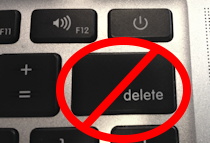The Internet doesn’t have a delete key
There’s never really been any medium like the Internet, with its millions of Web sites and thousands of sharing and social services. It’s not an “information superhighway”, it’s not a “huge bulletin board”, and it’s not “just like text messaging dozens of your friends”. Because of that, most parents are lost when trying to wrap their heads around how things work: there is no perfectly apt metaphor.
That misunderstanding breeds misinformation and that’s exactly what today’s teens have heard from their peers and, very occasionally, from their parents, that digital mistakes can be fixed, that nothing has permanence because the Web is a dynamic, “fluid” environment. It is, but for it to work, it’s also far more permanent than people realize.
When you’re connected to a Web site, for example, odds are very good that most of what you’re seeing is coming from what’s called a caching server somewhere between the actual computer that hosts the site and your own system, a snapshot that’s maybe a few minutes, maybe a day or more old. It helps the Internet run faster.
There are also archival services like The Internet Wayback Machine that take historical snapshots of as many sites as they can access for research purposes. Oh, and the Library of Congress , which receives regular archival copies of the entire public Twitter universe. Every. Single. Tweet.
And then there are search engines like Google and Bing, which operate by making a copy of every single page that they index and scour for customers. The copy of the page that just matched your latest search could be days, weeks or even months old. Again, that helps the Web keep humming.
As should be clear, however, all of these get in the way of deletion really deleting things.<
Don’t believe me? Delete your Facebook account, wait a few months, then sign up again. Magically, your _deleted_ account will be restored. Why? Because Facebook doesn’t actually remove things, they just make them invisible to public search.
As a result, when I talk with teens, I drum into them the harsh truth, that the Internet has no delete key. Whatever you post, be it a photograph, a short video, a status update, a story or a tweet, make sure it’s something you want to live on for years and years into the future.
Dave Taylor is a single father to three, blogging about it at GoFatherhood, and a well-known technology writer who manages the popular AskDaveTaylor tech Q&A site. You can find him everywhere online, but start on Twitter: @DaveTaylor

